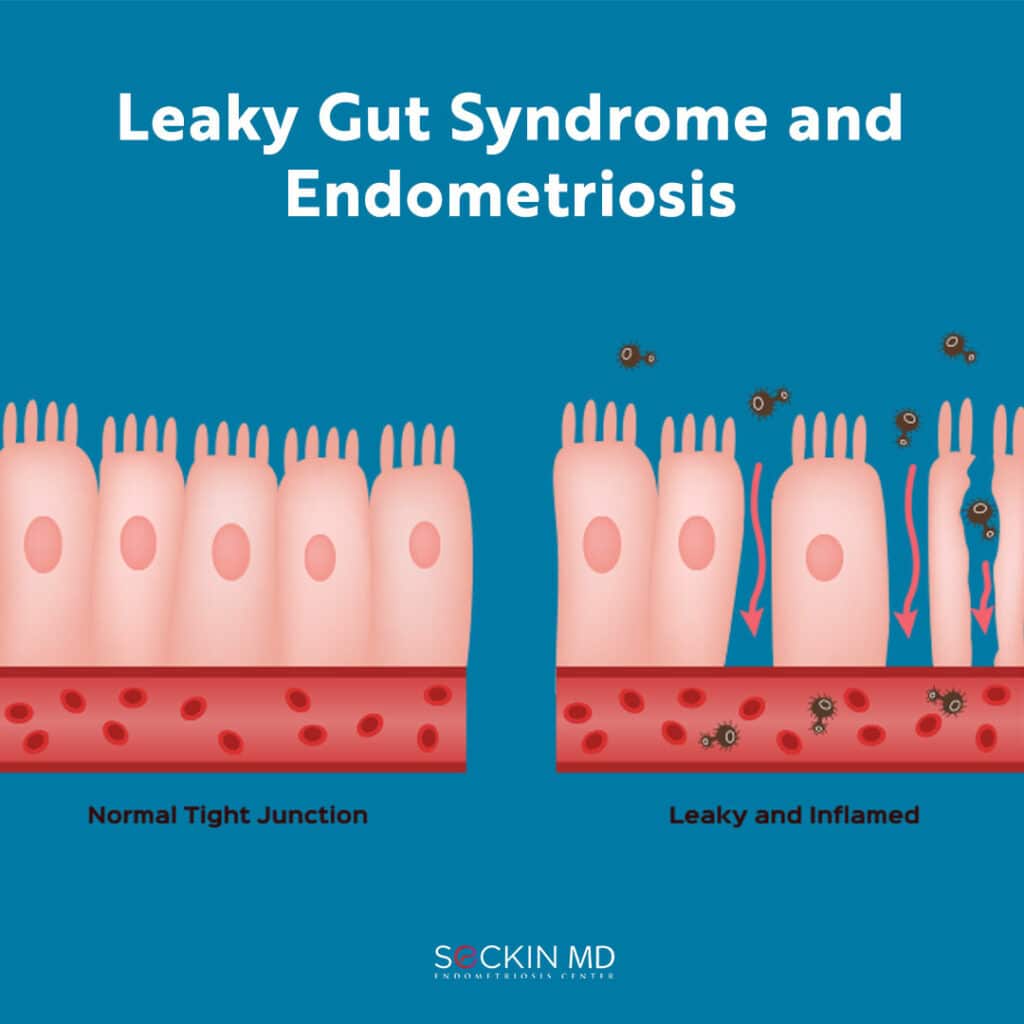Leaky Gut Syndrome and Endometriosis

Leaky gut syndrome is not an actual disease but a condition that indicates the increased permeability of the gut. Our gut (bowels, intestines, or gastrointestinal system) is naturally permeable to allow nutrients to pass through easily. However, there can be times when the permeability is too high.
What happens during leaky gut syndrome?
Our gastrointestinal system has a semi-permeable mucosal layer that forms a natural barrier between the outside world and the inside of our body. This layer, called the intestinal barrier, is the site of interaction between our immune system and microbes that come from the outside. The semi-permeable nature of this barrier acts as a filter, allowing nutrients to pass through while stopping harmful microbes and toxins.
In leaky gut syndrome, the function and permeability of this barrier are affected. This allows larger molecules that can be harmful to pass through the intestinal barrier and into the blood. Leaky gut syndrome is not a disease per se. It is more a sign of an underlying problem that can cause other diseases due to the “leak”.
What causes it?
No one really knows what causes leaky gut syndrome. However, the syndrome can occur at the same time as the following conditions:
- diseases that cause gut injury
- autoimmune disorders such as lupus, type 1 diabetes, and multiple sclerosis
- chronic inflammatory gastrointestinal conditions such as Celiac disease, Crohn’s disease, and irritable bowel syndrome (IBD)
- chronic fatigue syndrome and fibromyalgia
- asthma, allergies, and acne
- obesity
- HIV/AIDS
- chronic overuse of alcohol or pain medication
- Cancer treatment that affects the gut mucosa
What are the symptoms?
Intestinal permeability changes are not directly linked with any symptoms. But the factors that lead to hyperpermeability may have symptoms of their own. Some of these include:
- a burning feeling in the gut
- painful indigestion
- bloating
- a feeling of low energy
- diarrhea
- gastrointestinal mucositis
Does endometriosis affect gut microbiota?
The gut is a dynamic ecosystem full of microbes that are necessary for the proper health of the intestines and the body. Gut microbiota can influence inflammatory and metabolic changes. Some of these changes may lead to changes in hormone levels, including increased estrogen levels and estrogen metabolism.
Endometriosis is an inflammatory, estrogen-dependent disorder. Elevated estrogen levels increase the probability of epithelial cells to multiply, potentially influencing the development of endometriosis. The gut microbiota may therefore have a role in the regulation of the inflammation and hormonal changes that drive endometriosis.
Though there is no direct link between gut microbiota and endometriosis, a recent study in 66 endometriosis patients showed that the disease may result in an altered gut microbiota given that control samples had an overall higher diversity of the microbes.
Is there a link between endometriosis and leaky gut syndrome?
In endometriosis, tissue similar to the lining of the uterus occurs elsewhere in the body. It can happen outside of the pelvic regions including the wall of the abdomen, bowels, appendix, diaphragm, and pancreas.
Recent research seems to suggest that endometriosis may play a role in leaky gut syndrome. In a study funded by the Endometriosis Foundation of America (EndoFound), Dr. Shanti Mohling from the University of Tennessee discovered a possible link between endometriosis and leaky gut syndrome. All her patients who tested for increased intestinal permeability had current endometriosis or have had surgery for endometriosis in the past.
Dr. Mohling found evidence of leaky gut in these patients by looking at lactose and mannitol levels in their urine after giving them a sugary drink. These are large molecules, so their presence in the urine is a sign of a leaky gut.
The goal now is to find out how endometriosis may affect intestinal permeability and what could be environmental cues that can trigger a leaky gut syndrome in these patients. Dr. Mohling has 40 patients currently taking part in the study and has based her findings on 25 samples.
Do you or did you experience symptoms of leaky gut syndrome? Do you suffer from endometriosis? Please share your story by leaving a comment on our post on Facebook or Instagram.
Get a Second Opinion
Our endometriosis specialists are dedicated to providing patients with expert care. Whether you have been diagnosed or are looking to find a doctor, they are ready to help.Our office is located on 872 Fifth Avenue New York, NY 10065.
You may call us at (646) 960-3080 or have your case reviewed by clicking here.